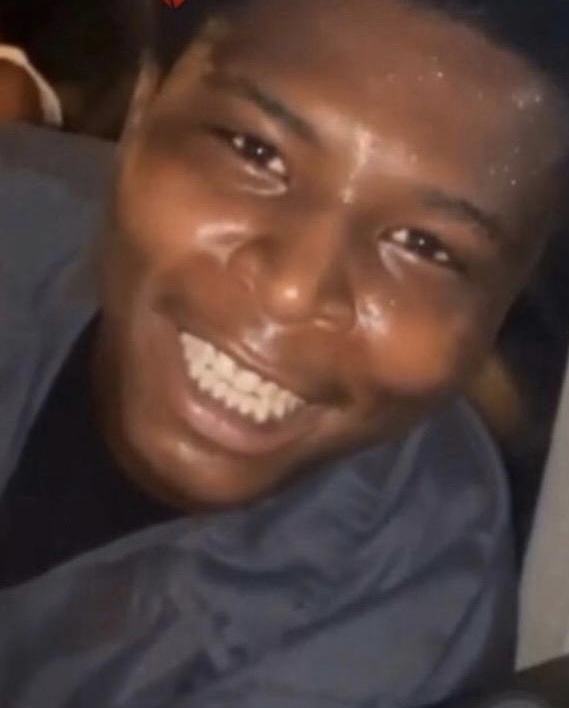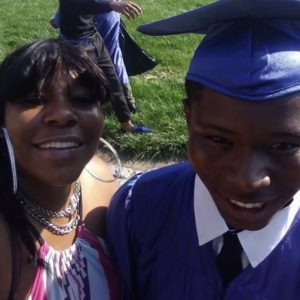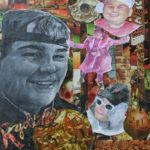
Shineka Crawford just knew that her baby boy would be a giant. During her pregnancy, her belly expanded so much that she looked like she was having twins. Swift karate kicks in the womb pummeled her insides. She spent seven months on bedrest.
Born on April 8, 2003, Shaquille “Shaq” Barbour (named after basketball legend Shaquille O’Neal) weighed 11 pounds and cracked mom’s pelvic bone during delivery.
He eventually sprouted to 6 feet 6 inches tall but preferred football to basketball. After being recruited as a defensive tackle for the Fox Rox Ravens in Northeast Philadelphia, he weighed 90 pounds by the time he was six years old and was pitted against kids two to three years older than him — despite complaints from the opposing team’s parents.
Shaquille gave up the sport at age 9, after winning multiple trophies and medals; he was upset that he had accidentally cracked one boy’s tailbone during a tackle and caused another boy to have a seizure.
A towering presence, Shaquille was determined grow up fast. As a young boy, he used eyeliner to draw a mustache on his face and spoke in a throaty voice.
He carried his father’s briefcase to elementary school and sold dollar store pencils and erasers at a markup. He tutored kids for 50 cents an hour and taught karate lessons, even though he didn’t have a belt of his own. He swept hair at the local barber shop, cut grass, and cleared rocks at construction sites, often sharing the proceeds with his family so that they could go to the amusement park or buy water ice.
“He always made sure I had a meal and money in my pocket,” said his older sister, Aminah Barbour. “He was like my second dad.”
During Shineka’s birthday cookout a couple years ago, Shaquille sold her shish kebabs and seafood salad to neighbors while she was at the store. She returned to a line out the door and her party food platters decimated. Beaming, Shaquille waved a wad of cash. Money, he knew, would buy him security and open doors. He wanted a large family someday and to be in the financial position to care for them.
After high school, Shaquille planned to join the Marines. Later, he hoped to develop a job training program for the city’s homeless population.
While attending Camelot Academy, Shaquille took a job as a laborer at the Pennsylvania Convention Center – often working until 11 p.m. — before he was laid off during the COVID-19 pandemic.
On June 6, 2021 at around 4:30 p.m. — one week shy of his graduation — Shaquille was riding his dirt bike back from picking up a hoagie at the corner store when he was shot 13 times by two gunmen in a car on the 1700 block of 68th Avenue in West Oak Lane.
Aminah, who had been planning to meet Shaquille at the family barbecue, heard the gunfire while driving up the street. She jumped out and cradled her brother’s body, praying over him. The 18-year-old died in her arms. No arrests have been made.
One month earlier, Aminah was shot in the back two blocks away. She recovered, but no suspects were charged. Shineka believes that the two crimes are connected.

Shaquille Barbour and his mother Shineka Crawford
Earlier last year, Shaquille, who lived with his mom in Hunting Park, showed her a rap video of two young men — former friends — threatening his life. He did not seem overly concerned about it, but Shineka took it seriously. Today, she carries a 9mm pistol with her and Aminah is terrified of loud bangs.
After Shaquille’s murder, Shineka noticed a string of judgmental comments on social media.
“He must’ve been a really bad person,” some wrote. “His parents must be on crack.”
In reality, Shaquille came from a loving home, surrounded by his two older sisters, Mecca, 25, and Aminah, 20, his mother and father. Though his parents later divorced, Shaquille learned “how to be a man,” how to be respectful and protect his family from harm, and to care about social justice causes from his dad, Joseph Barbour, Aminah said. Shaquille was the type of guy who would fight only when provoked, and he would shake your hand afterward.
As early as age six, Shaquille was disciplined for refusing to stand for the Pledge of Allegiance in school, after his parents taught him about the massacre of Native Americans and the history of slavery. He was similarly reprimanded by school administrators when he wore a kufi, a traditional religious cap for Muslim men.
As he grew older, Shaquille listened attentively as elderly neighbors and relatives discussed the dawning of the civil rights movement. He was disturbed by the police who mistook him for an adult and interrogated him on street corners, Shineka said.
Shineka joked that her tall and stocky son was her “bodyguard.” He was extremely protective of his mom and sisters, and would not hesitate to threaten their boyfriends if they did not behave like gentlemen. Only after his death did Aminah realize that Shaquille had stealthily tracked her iPhone location to make sure she was always safe.
“They took my right hand from me,” she said of her brother and best friend. “That was really my heart.”
An electrical fire in 2012 destroyed the family’s home and all their possessions in Northeast Philadelphia, but Shaquille managed to rescue his pitbull puppy from the blaze. Following that event, the pre-teen began to experience anxiety attacks, his heart racing without warning, Shineka remembered.
He maintained an upbeat attitude, however, encouraging neighbors with downcast eyes and slumped shoulders to be grateful for each day. “I wake up and I’m hearing the birds chirping and I’m still living,” he told them.
Shaquille was a favorite with elderly women, in particular, since he carried their groceries and gave them a pep in their step. “Look at you, still stopping traffic at your age!” he catcalled to two older women crossing the street, who began laughing and dancing.
He enjoyed a close bond with his mom, who has the same round face and high cheekbones. Shaquille confided in Shineka as he draped his long legs across her lap. He often talked about buying her a mansion outside of Philadelphia someday. He even forgave her after she trashed his gaming system because she worried that he was becoming addicted.
Together, they cooked large Sunday dinners for the family, interrupted by Shaquille digging up and gobbling up sugar snap peas from the garden. In the kitchen, the pair held reggae dance contests. Shaquille tried to imitate the Cabbage Patch and Running Man from Shineka’s era, while she attempted to replicate the latest dance craze on TikTok.
After Shineka tore her meniscus, her son encouraged her to jumpstart her recovery.
He took the crutches and said it’s time for you to walk to me and get them,” Shineka remembered. “Take those steps.”
Now, Shineka is trying to raise enough money to purchase a headstone for her son. He currently resides in an unmarked plot in Chelten Hills Cemetery in West Oak Lane.
Aminah will miss her brother’s uncanny ability to invent words and sounds to cheer her up. He smiled with his entire face, she recalled, with his perfect teeth and crinkly eyes. At least four cement blocks in Logan and West Oak Lane have the siblings’ initials engraved in them.
Shaquille was strong in his faith in Islam and prayed every day.
“The day before he passed,” Aminah remembered, “he told me that if he goes, don’t cry and don’t be crazy sad. Everybody’s going to go one day and he just knew it would be his time.”
A reward of up to $20,000 if available to anyone that comes forward with information that leads to the arrest and conviction of the person responsible for Shaquille Barbour’s murder. Anonymous calls can be submitted by calling the Citizens Crime Commission at 215-546-TIPS. Information can also be submitted to the Philadelphia Police Department online or by calling 215-686-TIPS.
Resources are available for people and communities that have endured gun violence in Philadelphia. Click here for more information.









